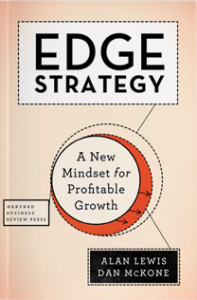There May Be Gold in Your Company’s Data Attic; How to Build Profitable New Business Out of Your Information Byproduct
Cargill’s Corn Seeds, Toyota’s Navigation Systems and UnitedHealth’s Insurance Paperwork all Spawned New Digital Businesses
BOSTON, MA (December 8, 2015) — Many manufacturing companies have long profited by selling what would otherwise be waste products of their factories. Oil companies sell the hydrogen created by oil refineries. Meat processors sell scraps for pet food.
Today companies in almost every industry have a valuable byproduct they are not capitalizing on: data.
Mundane accounting systems and customer databases are now raw materials that can be transformed into lucrative new services, according to Alan Lewis and Dan McKone, who advise major companies at L.E.K. Consulting.
“Your data could be the missing link for a company that has never had access to the side of your customers that only you see,” they write in Edge Strategy: A New Mindset for Profitable Growth (Harvard Business Review Press, January 2016). “Even data that may seem trivial to your business, when seen longitudinally over time, could be a prism of insight for another company.”
Lewis and McKone analyzed companies in 62 industries and found that the top performers consistently expand businesses that are on the periphery of their existing operations, taking advantage of capabilities or resources they already have. Their book offers examples of successful ways to use this approach such as the Geek Squad desk at Best Buy and the pizza oven at Whole Foods.
Building new digital services, their analysis shows, is among the easiest and most lucrative opportunities for many companies.
“The smart use of data can make nearly any product better,” Lewis says.
Business leaders will need to adopt a new more open mindset about data, which many companies guard as their crown jewels.
“Everyone is trying to mine their data aggressively asking, ‘How can I get an advantage over my competitor?'” McKone says. They are leaving money on the table, he argues, if they don’t also ask, “What company would be willing to pay for that data?”
UnitedHealth, for example, has built a business with $5 billion in annual revenue by reusing the information contained in all the claim forms it processes. This data allows drug companies to see how their products are used, how effective they are, and how well they are competing with rival drugs. This business, OptumInsight, had twice the profit margin and three times the growth rate of UnitedHealth overall in 2014.
“United has unlocked a highly profitable revenue stream that it would have completely missed if it had focused just on its core business,” McKone says.
Lewis and McKone cite figures that show that these opportunities certainly deserve the name “Big Data.” The digital universe contained 4.4 zettabytes in 2015, and that already unfathomable store will increase ten times over by 2020, they write. (A zettabyte is 1,000,000,000,000,000,000,000 characters.) The opportunity for business is growing far faster because currently only five percent of that data is being analyzed today, but more than one-third will be connected and available for analysis in 2020.
Much of this new data is going to be generated by what has been called the internet of things — the addition of wireless internet connections to the objects ranging from farm tractors to light switches.
“Now medical equipment, industrial equipment, mining tools, utilities — even garbage cans — all create and upload useful data,” Lewis says. The companies that make these objects, many that up to now have been far more mechanical than digital, can build new information businesses.
Already, Toyota, the master of assembly line efficiency, has built a new business that takes advantage of the GPS navigation devices it installs in cars sold in Japan. It captures the speed and position of cars and sells traffic data to municipal planning departments and corporate delivery fleets at prices that start at $2,000 a month.
While some data opportunities involve reaching out to unfamiliar industries, Lewis and McKone show that companies can also create information services to sell to their existing customers.
Cargill has built a new digital product line to supplement its age old business of selling crop seeds to farmers. By analyzing its large database of information on how its seeds performed in various types of soil and weather conditions, it built software called NextField DataRX that can give personalized advice to a farmer looking to increase crop yields.
Software development might appear to be a big leap from seed selling, but on closer inspection it was a relatively low risk and high return move, Lewis and McKone write.
“Cargill could use its already developed database that supported seed development to advise its customers in their own businesses,” Lewis says. “Bringing it to market was only a small incremental effort, but produced highly profitable returns, given the recurring nature of the revenue and its minimal cost of delivery.”
Edge Strategy shows executives how to look at their companies’ existing capabilities to find product enhancements that increase revenue, build services that broaden their relationships with customers, and even create businesses that capitalize on their existing assets to serve new customers. By developing an “edge mindset,” companies using this approach can consistently capture all of the return from the risks they have already taken.
For more information, or to schedule an interview with Alan Lewis or Dan McKone, contact Katarina Wenk-Bodenmiller of Sommerfield Communications at +1 (212) 255-8386 or katarina@sommerfield.com.
About L.E.K. Consulting:
L.E.K. Consulting is a global management consulting firm that uses deep industry expertise and rigorous analysis to help business leaders achieve practical results with real impact. We are uncompromising in our approach to helping clients consistently make better decisions, deliver improved business performance and create greater shareholder returns. The firm advises and supports global companies that are leaders in their industries — including the largest private and public sector organizations, private equity firms and emerging entrepreneurial businesses. Founded more than 30 years ago, L.E.K. employs more than 1,000 professionals across the Americas, Asia-Pacific and Europe. For more information, go to www.lek.com.
Edge Strategy® is a registered trademark of L.E.K. Consulting LLC





